Stringent EU Legislation Fuels Demand for Pumps
European Union (EU) legislation is acting as the primary driver for the European water and wastewater market for pumps, even as demand from eastern Europe promises exciting new growth potential.
Proactive operational efficiencies of municipal authorities and private water companies will overcome challenges related to investment flows, improper water distribution and treatment infrastructure, while supporting overall market expansion.
Frost & Sullivan finds that European Pumps in the Water and Wastewater Markets earned revenues of $1.48 billion in 2005 and estimates this to reach $1.84 billion in 2012.
“Stringent EU directives prescribing the maintenance of uniform standards of water quality across Europe is the primary driver for the pumps market in the water and wastewater sector,” says Frost & Sullivan Research Analyst Karthikeyan Balasubramaniyam. ”The urban wastewater treatment directive (UWWTD), which provides guidelines to identify water bodies that need urgent water treatment, is pressurising local authorities to improve water and wastewater treatment, thereby positively impacting the market.”
At present, regions like eastern Europe and Iberia have poor networking with respect to water distribution and wastewater treatment. In particular, the impact of EU regulations will be intense on accession countries due to the short time frame for executing directives. Eastern Europe, Iberia and parts of Italy and France are undertaking large-scale implementation of water treatment plants. The combined impact of all these factors will increase the demand for pumps, thereby providing the needed impetus for the growth of the pumps market in Europe.
Among the key challenges that manufacturers face are the high level of competition and the need to continuously invest in research and development. In Germany and others parts of western Europe, the market is in the initial stages of maturity, creating a compelling need to be innovative and gain an edge over the competition.
“With most of western European countries already having implemented the EU directives, the need to provide flexible and complete servicing of pumping equipment will be critical to generating business,” notes Mr. Balasubramaniyam. “Innovations in pump design have slowed down, and control and monitoring systems will have a significant impact on pump sales.”
As a result, these areas will need augmented investments. Such investments will be vital to ensuring product differentiation and enable manufacturers to gain a competitive advantage.
Intensifying competition will compel manufacturers to consider competitive pricing and the provision of complete end-to-end solutions. Despite saturation in the larger regional market like Germany, the overall European market will witness slow and steady growth.
“The evident signs of market saturation and high competition have forced manufacturers to become more customer friendly, and provide complete pumping solutions including efficient servicing to sustain customer loyalty and increase market penetration,” explains Mr. Balasubramaniyam. “Offering value-added service together with competitive pricing will benefit manufacturers in terms of enlarging their market share.”
Source: Frost & Sullivan







